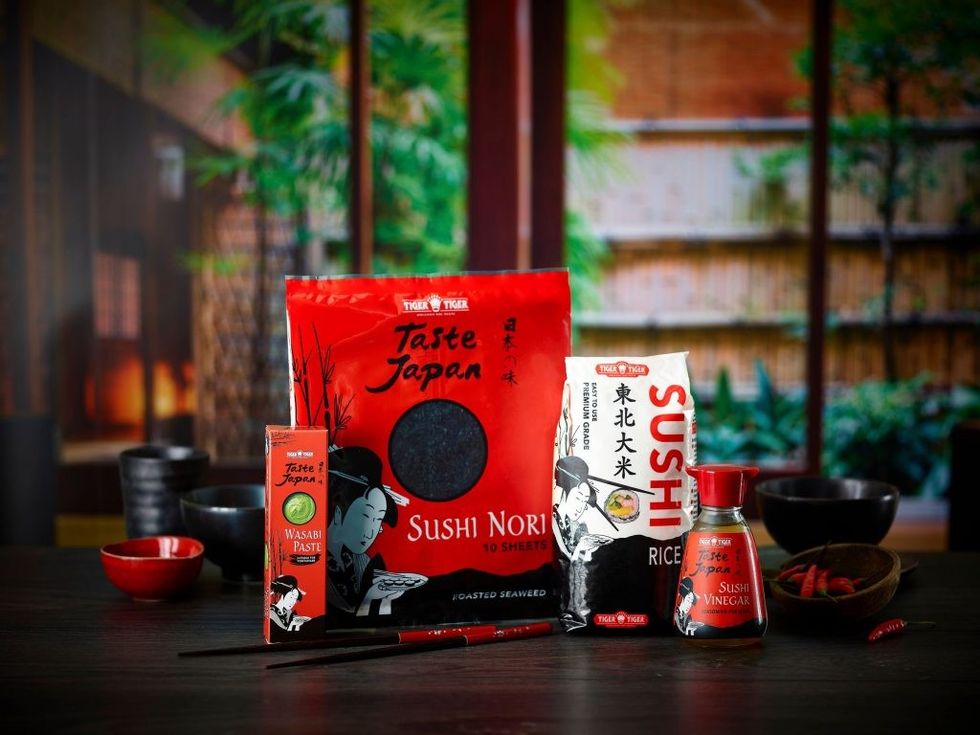World food is one of the triumphs of British food, in the sense that global cuisines have been so enthusiastically adopted by the UK population that they are almost seen as part of the country’s traditional larder.
For example, we all have heard how “curry” has long displaced fish and chips as the national dish. But Italian food (pasta, pizza), Chinese dishes – Thai, Indonesian, Korean and Japanese as well, now – are unremarkable meal choices welcomed with delight by almost everybody. Which family does not cook or order Mexican food? “Mexican is 32 per cent more likely to feature in ‘together time’ evening meals; it sparks conversation as people pass dishes and can be customised to everyone’s individual taste – so it’s a great experience for everyone,” says Aditi Hilgers, Marketing Manager at Old El Paso.
And how about Portuguese/Brazilian (Nando’s anyone?); and who would deem US burgers or fried chicken “foreign” in any meaningful way? Greek, Eastern Mediterranean and Middle-Eastern dishes, likewise, have travelled far beyond the communities that first introduced them to Britain, and like the other recipe ranges are enjoyed and loved now by the population as a whole.
So many foods of other nations and cultures have found a welcome here that if anything, the real difficult lies in determining what British food is – although roast beef and Yorkshire pudding (and the traditional fish and chips) are enjoying a healthy afterlife on pub menus everywhere.

So, perhaps more than any change, it is the deepening knowledge and sophistication of consumers that is now influencing the market for world food more than the introduction of unknown cuisines – which would be taken in their stride by the British public, accustomed to and eager to try anything new.
In fact interest in global cuisine is gaining popularity and 52 per cent of UK consumers say they are open to being more experimental with their food choices than they were pre-pandemic, says Tilda’s Head of Sustainability & External Affairs Jonathan Calland. As consumers look to recreate restaurant quality food at home, modern Asian cuisine particularly continues to trend with strong market appeal
Quality ingredients, new sauces and tastes, regional variants, more premium lines – these are increasingly the factors involved in sustaining and generating new sales in the World Food and Drink category, reflecting the widespread participation and sophistication of the national palate.
A great base
Pasta, pulses, grains, potatoes and perhaps above all, rice: these are the staples, the foundations and the enhancers of great world cuisines. And of these, perhaps the most widespread and influential is of course rice. It has truly colonised the planet from China to Spain via India and Arabia to the Deep South of the USA – almost every food culture now has in it a place for rice of some kind.
“Trends such as scratch cooking, flexitarianism and consumption of world cuisines are here to stay,” says Calland. “In addition, the at-home lunch and dinner occasion will continue to grow as hybrid working remains. With rice being such a versatile ingredient, the category will benefit from these long-term trends, in turn driving greater penetration.”
He strongly advises that retailers ensure shelves are fully stocked and regularly re-stocked, so not to miss out on valuable sales – we can all recall the horror of not always being able to get our hands on sufficient rice during the early lockdown – a situation Tilda’s efforts at the time improved no end.
Calland also recommends that you:
- Ensure prices are clearly displayed to make the shopping experience as easy as possible
- Provide a selection of pack sizes and formats, to cater for multiple shoppers and occasions
Debbie King, Sales & Marketing Director at JK Foods, the UK’s leading importer and distributor of pan-Asian foods and owner of the Tiger Tiger brand, reveals that Around 96 per cent of the wildly popular and ever-growing East Asian category is based on just four main cuisines – Japanese, Chinese, Thai and Korean.
“One of the ways in which we are actively working with retailers is by creating more opportunities to sell throughout the year. As a brand, [Tiger Tiger} is developing additional ways to increase uplift by extending the year-round appeal of pan-Asian food – for example, by giving BBQ season a twist by using our Thai Chilli dipping sauce as a marinade for chicken, or substituting the usual ketchups for our incredible Thai Sriracha sauces and mayonnaise.
She says that seasonality and meal occasions will remain important but it is crucial independent retailers recognise opportunities throughout the year. “Indian food for example plays a key role in many religious festivals throughout the year,” she explains, “yet seasonality is much less prominent within East Asian foods.”
Maximising the opportunities for key calendar occasions is therefore critical – retailers should take relevant products out of the fixture and on to an aisle end for high visibility, while positioning them as a ‘total meal solution’ will help increase basket spend.
Excellent ingredients
Whether it is meal NPDs or newly sourced or enhanced individual cooking or table ingredients, the quality and culture of excellence among World Food suppliers improves all the time, especially in terms of convenience.
For example, following a range of innovative launches, last year Tilda introduced Limited Edition Katsu Curry Rice (RSP £1.59).
“We aim to bring new shoppers into the category, with the new launch, by introducing innovative and unique flavours to create excitement and interest amongst consumers,” says Calland.
“Over the last year we’ve worked to communicate to consumers to show them how Tilda provides the high-quality grains and great tasting rice needed to elevate any dish – bringing them international flavours,” he continues. “A dedicated campaign highlighted Tilda’s great taste and quality credentials and positioned the brand’s steamed rice as a fundamental part for a variety of different cuisines, inspiring consumers to broaden their repertoire and try Tilda’s tasty range of two-minute rices.”
Made using authentic Jasmine rice, this new Katsu Curry recipe from Tilda features a unique blend of aromatic mild curry spices combined with the slightly sweet taste of carrots, tamarind, and coconut cream to provide a delicious modern Asian inspired twist.
“The World Food & Drink category is performing particularly well, with continuing to demand more adventurous flavours,” agrees Kevin Butterworth, Chief Marketing Officer at Symington’s.

He says that with exposure to foods from across the globe at all-time high, British shoppers are looking for a variety of flavours to fill their baskets. The market has been consistently increasing over the years, with more consumers demanding authentic flavours: “Our great-tasting snack brand Naked, now worth £19.5m, fits the bill perfectly,” he says
The Naked Noodle Sweet Chilli flavour has been a hit with consumers, and Butterworth says it is the best performing flavour (chili is still all the rage and the trend shows no sign of “cooling off”), showing that more exotic flavours are here to stay. “Our Naked Big Eat range has also seen more growth through shoppers buying more per trip,” says Butterworth.
“Our brand-new launch, Naked Ultimate Noodles, meets the demand for interesting flavours while tapping into the trend of vegan and vegetarian products. Naked Noodle provides really tasty south-east Asian flavours made with real, natural ingredients, in an instant. As with other Naked products, the Ultimate range has been developed with a focus on delivering an authentic taste experience for consumers.
So pay special attention to the East Asian trend, not just in fast or ready meals but in ingredients for scratch cooking and table pots, too.
“Retailers should be aware of the four main segments also driving growth of the East Asian foods category – soy sauce, noodles, ingredients and bases add enhancers – if they are to capitalise on this rising demand,” adds Debbie King. All are available through JK Foods – a valuable “one stop shop” for retailers seeking on-trend authenticity, range and value which also reduces the complexity of the supply chain.
“We’re encouraging the ritualisation of Mexican with our campaign Fajita Friday,” says Hilgers of Old El Paso. “After weekdays and weekends started to merge due to various lockdowns, Fajita Friday was designed to help families, households and friends reclaim that Friday feeling. The campaign kicked off last year across radio, influencers & social, and encouraged consumers to take part in their own end-of-week fiesta with fajitas, family, and fun.”
Food futures
As many consumers continue to work from home, they are looking for quick lunch and dinner options that are varied, exciting and tasty.
“Tilda’s Ready to Heat range is ideal for the at-home eating occasion. Ranging from plainer variants like Pure Basmati or Fragrant Jasmine to more adventurous flavours from world cuisines, such as Peri Peri or Caribbean Rice & Peas,” Calland says. Appealing to health-conscious consumers, these dishes deliver speedy meal preparation with perfect portions ready in two minutes, enabling consumers to complete any tasty and nutritious mid-week meal. “We would recommend stocking more options from the Tasty Wholegrains range, too, as they are a source of fibre,” he adds.
“[Another] trend which seems to be going from strength to strength is the demand for more vegan and free-from friendly products to maximise consumer health,” says Symington’s Butterworth. “Based on our research, we believe health will continue to be the primary motivator behind people eating less meat, with 86 per cent of plant-based meals eaten by non-vegans. Consumers are driven by naturalness but are also looking for products that are easy and quick to prepare. Ingredients that combine key trends are potentially the most interesting.”
Symington’s is well-placed to benefit from the fashion:
“Our Naked Veg Pots are available in three authentic flavours: Malaysian Rendang Curry, Korean BBQ Ramen and Chinese Green Veg Broth. Our Veg Pots are 100 per cent plant-based and also count towards one of your five a day – the first from the portfolio to hold the health credential.
“Our great tasting Blooming Good Food Co. snack pots are also 100 per cent plant-based. The instant hot snacks are available in four flavours, Warming Tomato & Lentil Dhal, Banging Black Eyed Bean & Vegetables, Hearty Sweet Potato & Lentil Curry, and Smokey Sweetcorn & Green Beans. The product has performed well in the market, and we’ve continued to see growth.”
World cuisines are now firmly embedded in the UK’s food culture but we’re now seeing the significant – and lasting – impact of the Covid-19 pandemic playing out through some quite major changes in shopper behaviours, believes Debbie King.
She explains how throughout lockdown the market saw the re-emergence of home cooking as consumers sought to replicate restaurant meal experiences – “people were seeking taste adventures from their food in order to brighten up long days stuck at home”. Debbie thinks that even though restrictions have now lifted, consumers are still seeking intense and authentic flavour, but convenience and ease of preparation is also influencing their purchase decisions. “Time-poor consumers are also looking for at-home pan-to-plate solutions in less than 20 minutes – important considerations which will continue to drive sales.”
And she adds that pan-Asian foods, once deemed exotic or “unusual”, have become much more mainstream due to the rapid growth of the casual dining sector and the popularity of restaurant chains such as Wagamama, “which has really driven awareness of key products such as Udon noodles, now one of the most popular meals on the menu.”
King concludes that, as IRI data to the end of 2021 indicates, the value of East Asian foods in world foods will be £54.5m and growing year on year, well outperforming its counterparts in the mainstream aisle, which is in decline year on year.
So: home cooking, convenience and speed, health, and an expansion in East Asian cuisine especially (but in all world foods, apparently) are the takeaways from our experts in global dining.







